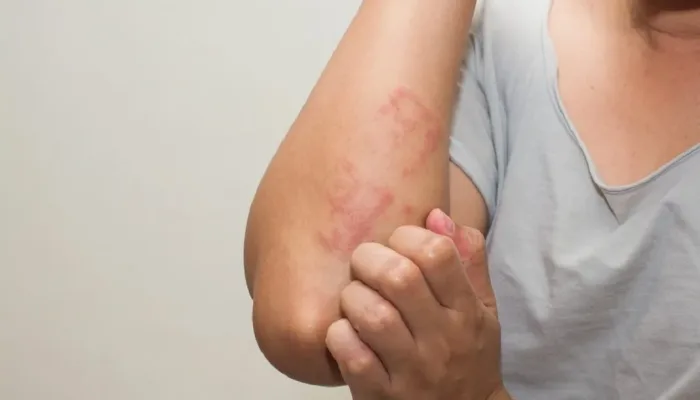- Home
- Eczema
Eczema
Eczema
Eczema, also referred to as dermatitis, is a term for skin conditions identified by skin irritation or inflammation. Eczema causes the most common itchy rash in children.
Eczema can be categorized into two types. Contact dermatitis ( Exogenous eczema) arises when objects or chemicals irritate the skin and induce an allergic reaction. When there is a hereditary or inherited tendency to develop eczema, it is termed “Constitutional” eczema ( Endogenous eczema).

Causes of Eczema
The cause of eczema is unclear, or there may be a combination of different factors at play. Eczema runs in families, but it is not passed on from person to person.
Chemicals, detergents, soap, and shampoo can all cause skin irritation. Some compounds may not be irritants, but they can trigger a reaction if the skin becomes sensitized or allergic to them.
Symptoms of Eczema
Eczema comes in a variety of forms, each with its own set of causes and symptoms.
Atopic Eczema
Atopy is a term that refers to a genetic predisposition to a number of allergy diseases, such as asthma, hay fever, and eczema. The face, trunk, backs of knees, and fronts of elbows are commonly affected by atopic eczema. It usually begins in childhood and affects 15-20% of children. Most people grow out of it by adulthood, however it persists in about 2-3% of adults.
Allergic Contact Eczema
Allergic contact eczema occurs when the immune system of the body reacts to a chemical that comes into touch with the skin. The rash normally begins at the point of contact with the material, although it might spread to other parts of the body. Nickel which is a metal present in some jewellery, for example, can cause eczema on the earlobes, wrists, and around the neck. Rubber and perfume are two more common causes of this type of dermatitis.
Irritant Contact Eczema
Irritant contact eczema is a type of eczema caused by repeated contact with common household items such as detergents in soaps and shampoos. The hands are the most frequently affected parts of the body.
Seborrhoeic Eczema
Seborrhoeic eczema The greasy rash appears on the scalp, face, armpits, groin, and skin beneath the breasts. This disorder is thought to be caused by a yeast called pityrosporum, according to some experts. Cradle cap is a form of the condition that affects babies’ scalps.
Varicose Eczema
Varicose eczema The skin becomes scaly, itchy, and irritated, especially around the ankles.
Discoid Eczema
Discoid eczema is a type of eczema that affects the arms and legs and is most common in middle-aged men. Eczema manifests itself as a series of circular patches.
Treatment of Eczema
Home treatment
If you know what irritants are causing your eczema, the best treatment is to avoid them. Soaps, washing powders, bubble baths, and shampoos, as well as any chemicals you work with, could be the source of the problem.
Many eczema treatments are available without a pharmacist’s prescription. These are mainly emollients, which work to keep the skin moist by minimizing water loss. They can be used as creams or lotions to apply directly to the skin. It is recommended to apply creams right after a shower. Oils or washes that can be used in the shower or added to the bath are also available.
Creams or shampoos containing antifungal medication, as well as compounds containing selenium or coal tar, are often effective in treating seborrhoeic eczema. It’s also a good idea to put mittens on babies to keep them from scratching.
Medications
If emollients alone are ineffective, a steroid cream or ointment should be used next. Steroids reduce eczema flare-ups by reducing the body’s inflammatory response. Steroids come in various strengths and should only be used for a few days at a time. Apply them sparingly and with the gentlest cream you can find. Only mild steroids should be used on the face. Overuse of steroid cream can cause skin thinning, making it more delicate and resulting in blemishes, wrinkles, and visible tiny blood vessels. Mild steroid creams, such as 1% hydrocortisone, are available over the counter at pharmacies, but higher steroid creams require a doctor’s prescription. Emollients should be used in conjunction with steroid creams. More information will be available from the pharmacist.
To relieve the itching of eczema, antihistamine tablets or medications may be recommended. These can be sedating or non-sedating, depending on whether you’re using them at night or during the day.
If the eczema is complicated by a bacterial infection, antibiotics may be required.
Severe eczema may require steroid therapy in the form of tablets on occasion.
In the most serious cases, hospitalization may be required. It may be necessary to wrap the damaged skin in bandages soaked in a diluted potassium permanganate solution.
Diet
There is no proof that dietary modifications can help people with eczema. Some people feel that removing eggs or cow’s milk from a child’s diet may help, but exclusion diets can lead to calcium or protein deficit, which can be harmful.
Non-steroid creams, herbal creams, and homeopathy are among more options. Evening Primrose Oil pills are a viable solution (over the age of 1 year).

